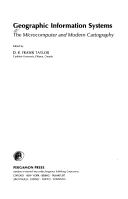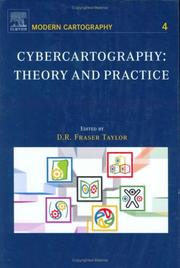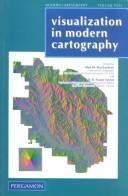| Listing 1 - 10 of 14 | << page >> |
Sort by
|

ISBN: 008040278X 9781483292861 148329286X 0080402771 9780080402789 9780080402772 9780804027809 Year: 1991 Volume: 1 Publisher: Oxford : Pergamon,
Abstract | Keywords | Export | Availability | Bookmark
 Loading...
Loading...Choose an application
- Reference Manager
- EndNote
- RefWorks (Direct export to RefWorks)
Geodesy. Cartography --- Information systems --- Geographic information systems. --- Geographic information systems --- Geographical information systems --- GIS (Information systems) --- Information storage and retrieval systems --- Geography --- Study and teaching --- Audio-visual aids --- Computer programs

ISBN: 0080431119 9780080431116 9786611072094 1281072095 0080539181 9780080539188 9781281072092 Year: 1998 Volume: 3 Publisher: New York Pergamon
Abstract | Keywords | Export | Availability | Bookmark
 Loading...
Loading...Choose an application
- Reference Manager
- EndNote
- RefWorks (Direct export to RefWorks)
Policy Issues in Modern Cartography addresses policy issues of special interest to cartographers. Some of them, such as copyright and intellectual property rights, are not new but take on new significance as a result of technological changes. Modern cartography is deeply interested in the technological advances of the information revolution and their impact on the discipline and profession. The vast majority of the growing literature in recent years has dealt with some aspect of technological change. What can be described as obsession with technological change has, in the last
Cartography --- Geographic information systems --- Government policy --- Geographical information systems --- GIS (Information systems) --- Information storage and retrieval systems --- Cartography, Primitive --- Chartography --- Map-making --- Mapmaking --- Mapping (Cartography) --- Mathematical geography --- Surveying --- Map projection --- Maps --- Geography --- Government policy. --- Cartography - Government policy --- Geographic information systems - Government policy

ISBN: 9780444516299 0444516298 9780080472300 0080472303 9786610966035 1280966033 Year: 2005 Volume: 4 Publisher: Amsterdam ; Boston : Elsevier,
Abstract | Keywords | Export | Availability | Bookmark
 Loading...
Loading...Choose an application
- Reference Manager
- EndNote
- RefWorks (Direct export to RefWorks)
For generations, the map has been central to how societies function all over the world. Cybercartography is a new paradigm for maps and mapping in the information era. Defined as "the organization, presentation, analysis and communication of spatially referenced information on a wide variety of topics of interest to society,? cybercartography is presented in an interactive, dynamic, multisensory format with the use of multimedia and multimodal interfaces. Cybercartography: Theory and Practice examines the major elements of cybercartography and emphasizes the importance of intera
Multimedia cartography --- Cartography --- World Wide web --- Cartographie multimédia --- Cartographie --- Web --- Data processing --- Informatique --- Multimedia cartography. --- World Wide Web. --- W3 (World Wide Web) --- Web (World Wide Web) --- World Wide Web (Information retrieval system) --- WWW (World Wide Web) --- Hypertext systems --- Multimedia systems --- Internet --- Mapping, Multimedia --- Multimedia mapping --- Data processing. --- Cartography - Data processing --- Cartographie - Informatique

ISBN: 9780080431116 0080431119 9780080539188 0080539181 1281072095 9781281072092 9786611072094 Year: 1998 Publisher: New York : Pergamon,
Abstract | Keywords | Export | Availability | Bookmark
 Loading...
Loading...Choose an application
- Reference Manager
- EndNote
- RefWorks (Direct export to RefWorks)
Policy Issues in Modern Cartography addresses policy issues of special interest to cartographers. Some of them, such as copyright and intellectual property rights, are not new but take on new significance as a result of technological changes. Modern cartography is deeply interested in the technological advances of the information revolution and their impact on the discipline and profession. The vast majority of the growing literature in recent years has dealt with some aspect of technological change. What can be described as obsession with technological change has, in the last
Cartography --- Geographic information systems --- Government policy --- Government policy.

ISBN: 9780444516299 0444516298 9780080472300 0080472303 Year: 2005 Publisher: Amsterdam Boston
Abstract | Keywords | Export | Availability | Bookmark
 Loading...
Loading...Choose an application
- Reference Manager
- EndNote
- RefWorks (Direct export to RefWorks)
For generations, the map has been central to how societies function all over the world. Cybercartography is a new paradigm for maps and mapping in the information era. Defined as the organization, presentation, analysis and communication of spatially referenced information on a wide variety of topics of interest to society, cybercartography is presented in an interactive, dynamic, multisensory format with the use of multimedia and multimodal interfaces. Cybercartography: Theory and Practice examines the major elements of cybercartography and emphasizes the importance of interaction between theory and practice in developing a paradigm which moves beyond the concept of Geographic Information Systems and Geographical Information Science. It argues for the centrality of the map as part of an integrated information, communication, and analytical package. This volume is a result of a multidisciplinary team effort and has benefited from the input of partners from government, industry and other organizations. The international team reports on major original cybercartographic research and practice from a variety of disciplinary perspectives, including the humanities, social sciences including human factors psychology, cybernetics, English literature, cultural mediation, cartography, and geography. This new synthesis has intrinsic value for industries, the general public, and the relationships between mapping and the development of user-centered multimedia interfaces. * Discusses the centrality of the map and its importance in the information era * Provides an interdisciplinary approach with contributions from psychology, music, and language and literature * Describes qualitative and quantitative aspects of cybercartography and the importance of societal context in the interaction between theory and practice * Contains an interactive CD-Rom containing color images, links to websites, plus other important information to capture the dynamic and interactive elements of cybercartography.
Book
Year: 1972 Publisher: Monticello (Ill.): Council of planning librarians
Abstract | Keywords | Export | Availability | Bookmark
 Loading...
Loading...Choose an application
- Reference Manager
- EndNote
- RefWorks (Direct export to RefWorks)

ISBN: 0080424155 0080424163 9780080424156 9781483287928 1483287920 9780080424163 Year: 1994 Volume: 2 Publisher: Oxford, U.K. New York Pergamon
Abstract | Keywords | Export | Availability | Bookmark
 Loading...
Loading...Choose an application
- Reference Manager
- EndNote
- RefWorks (Direct export to RefWorks)
Geodesy. Cartography --- Cartography. --- Visualization. --- Basic Sciences. Geography --- Geography (General) --- #TELE:MI2 --- Geography (General). --- Cartography --- Visualization --- Visualisation --- Imagery (Psychology) --- Imagination --- Visual perception --- Cartography, Primitive --- Chartography --- Map-making --- Mapmaking --- Mapping (Cartography) --- Mathematical geography --- Surveying --- Map projection --- Maps
Book
ISBN: 9780128035092 0128035099 0128035560 9780128035566 Year: 2015 Volume: 6 Publisher: Amsterdam : Elsevier Science,
Abstract | Keywords | Export | Availability | Bookmark
 Loading...
Loading...Choose an application
- Reference Manager
- EndNote
- RefWorks (Direct export to RefWorks)
Reflexive Cartography addresses the adaptation of cartography, including its digital forms (GIS, WebGIS, PPGIS), to the changing needs of society, and outlines the experimental context aimed at mapping a topological space. Using rigorous scientific analysis based on statement consistency, relevance of the proposals, and model accessibility, it charts the transition from topographical maps created by state agencies to open mapping produced by citizens. Adopting semiotic theory to uncover the complex communicative mechanisms of maps and to investigate their ability to produce their own messages and new perspectives, Reflexive Cartography outlines a shift in our way of conceptualizing maps: from a plastic metaphor of reality, as they are generally considered, to solid tools that play the role of agents, assisting citizens as they think and plan their own living place and make sense of the current world--Page [4] of cover.
Cartography --- History --- Cartography. --- Cartography, Primitive --- Chartography --- Map-making --- Mapmaking --- Mapping (Cartography) --- Mathematical geography --- Surveying --- Map projection --- Maps --- Cartography - History --- Història de la cartografia --- Història dels mapes --- Cartografia --- History.
Book
ISBN: 0444627170 0444627138 1306213088 9780444627131 9780444627179 9781306213080 Year: 2014 Volume: 5 Publisher: Amsterdam Boston
Abstract | Keywords | Export | Availability | Bookmark
 Loading...
Loading...Choose an application
- Reference Manager
- EndNote
- RefWorks (Direct export to RefWorks)
Cybercartography is a new paradigm for maps and mapping in the information era. Defined as ""the organization, presentation, analysis and communication of spatially referenced information on a wide variety of topics of interest to society,"" cybercartography is presented in an interactive, dynamic, multisensory format with the use of multimedia and multimodal interfaces. Developments in the Theory and Practice of Cybercartography: Applications and Indigenous Mapping examines some of the recent developments in the theory and practice of cybercartography and the substantial cha
Multimedia cartography. --- Cartography --- World Wide Web. --- Data processing. --- W3 (World Wide Web) --- Web (World Wide Web) --- World Wide Web (Information retrieval system) --- WWW (World Wide Web) --- Hypertext systems --- Multimedia systems --- Internet --- Mapping, Multimedia --- Multimedia mapping --- 528.9 --- 528.9 Cartography. Mapping (textual documents) --- Cartography. Mapping (textual documents) --- Multimedia cartography --- Data processing --- Cartography - Data processing
Book
ISBN: 0128157062 0128153431 9780128157060 9780128153437 Year: 2019 Publisher: Amsterdam ; Oxford ; Cambridge, Mass. : Elsevier,
Abstract | Keywords | Export | Availability | Bookmark
 Loading...
Loading...Choose an application
- Reference Manager
- EndNote
- RefWorks (Direct export to RefWorks)
"Cybercartography in a reconciliation community: engaging intersecting perspectives... gathers perspectives on issues related to reconciliation - primarily in a residential/boarding school context - and demonstrates the unifying power of cybercartography by identifying intersections among different knowledge perspectives. Concerned with understanding approaches toward reconciliation and education, preference is give to reflexivity in research and knowledge dissemination. The positionality aspect of reflexivity is reflected in the chapter contributions concerning various aspects of cybercartographic atlas design and development research, and related activities. In this regard, the book offers theoretical and practical knowledge of collaborative transdisciplinary research through its reflexive assessment of the relationships and knowledge involved in cybercartographic research."--
Cartography --- Data processing. --- Multimedia cartography. --- Knowledge, Sociology of. --- Knowledge, Theory of (Sociology) --- Sociology of knowledge --- Communication --- Knowledge, Theory of --- Public opinion --- Sociology --- Social epistemology --- Mapping, Multimedia --- Multimedia mapping
| Listing 1 - 10 of 14 | << page >> |
Sort by
|

 Search
Search Feedback
Feedback About
About Help
Help News
News